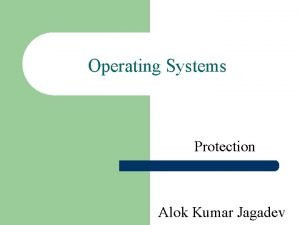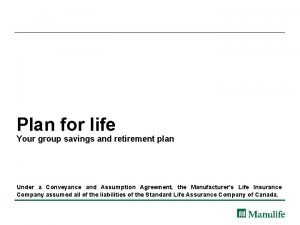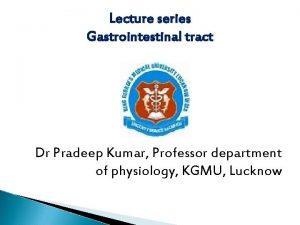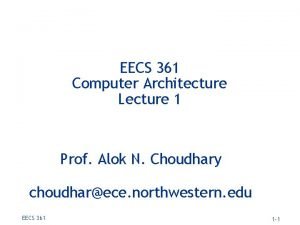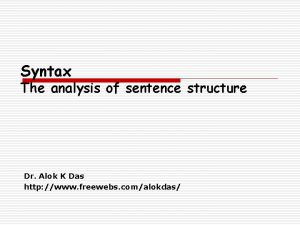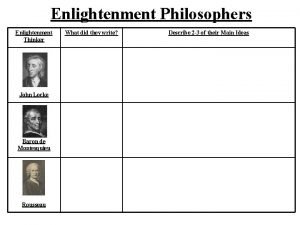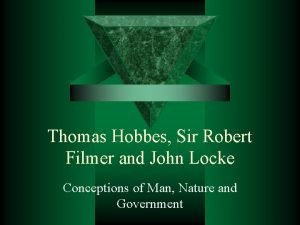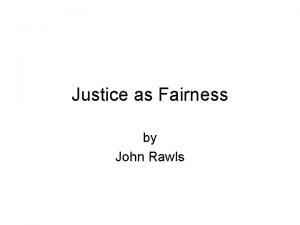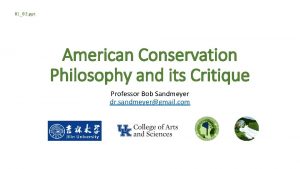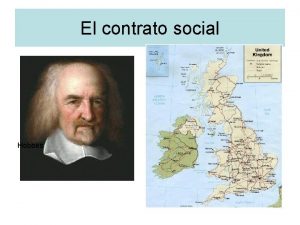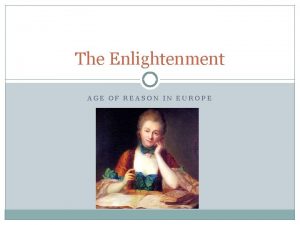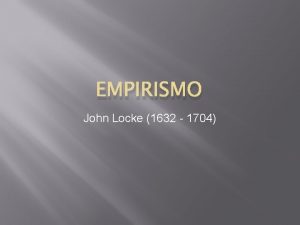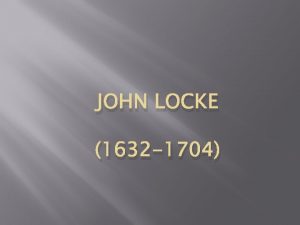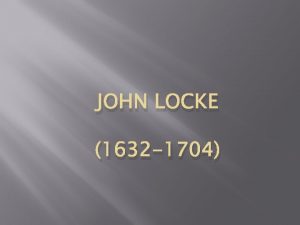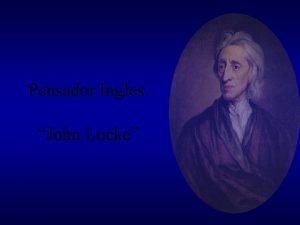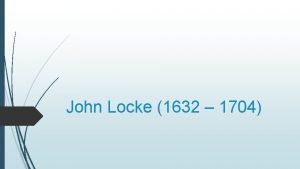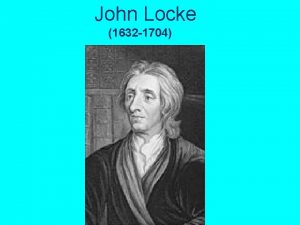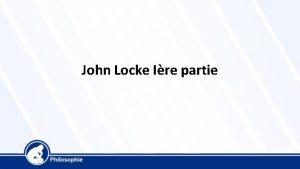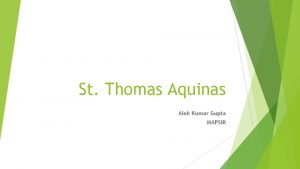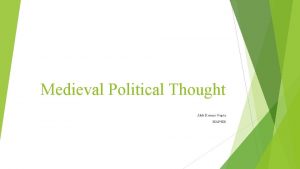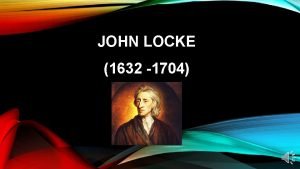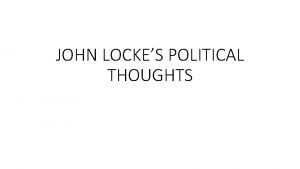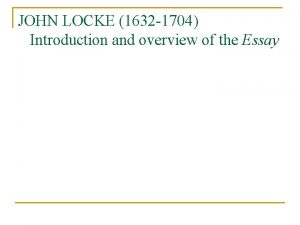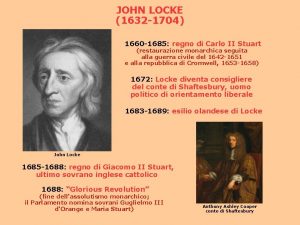John Locke 1632 1704 Alok Kumar Gupta MAPSIR




















- Slides: 20

John Locke (1632 -1704) Alok Kumar Gupta MAPSIR

John Locke was born in 1632 when Hobbes was forty-three years old, and died in 1704. He was a witness to the restoration of King Charles II in 1660 and the Bloodless Revolution of 1688 of which he became theorist. John Locke who sought to justify the Revolution of 1688, was an ardent advocate of constitutional monarchy. In his Two Treatises on Government Locke upheld the ultimate right of the people to remove the monarch from his authority if he ever behaved in a despotic manner. Locke, with an innate British conservatism, was not the sworn enemy of monarchy; his purpose was to establish it in the consent of the people.

Works of Locke His first Letter on Toleration was published in 1689. Two Treatises on Government in 1690. Essay Concerning Human Understanding in 1690.

Locke on Human Nature According to him, men are decent, orderly and society-loving, capable of ruling themselves. They are rational and social. Rationality is a pervasive characteristic of man. Rational, in that they could live together by the law of nature which is reason, or which at least (though not imprinted on the mind) is knowable by reason, without the help of revelation. Also, they are impelled by their inner nature to treat humanity—whether in their own person or in that of any other person—in every case as an end, never as a means only.

Social, in that they could live by the laws of nature without the imposition of rules by a sovereign. According to Locke, the individual can live in a moral way even without the state. Man by nature is endowed with the light of reason which he calls the “spark of divine nature”. This spark enables man to discern and follow the law of nature which is behind all things.

Locke on State of Nature “Men living together according to reason, without a common superior on earth with authority to judge between them is properly the state of nature. ”

While the state of nature of Hobbes was both pre-social and pre-political, that of Locke was only pre-political. According to Locke, people lived in society in the state of nature. They were social and had rights and liberties. The majority of the people in the state of nature obey the law of nature, i. e. the law of inward morality. But there are few recalcitrant who cause inconvenience to the rest. The state of nature was, thus, not one of universal war but one of inconvenience. The reason was that there was the standing want of an established and known law. The law of nature was given individual interpretation by every individual. There was the lack of a known and indifferent judge who could give an authoritative interpretation of the law of nature.

Life was inconvenient because each individual had to interpret the law of nature for himself and had also to enforce it without the help of any other authority. According to Locke, the state of nature was a state of equality and freedom. The individual was endowed with sound natural rights. To quote him, “The state of nature has a law of nature to govern it which obliges every one; and reason, which is that law, teaches all mankind who will but consult it, that being all equal and independent, no one ought to harm another in his life, health, liberty, or possessions. ”

Therefore, in the state of nature, people experienced certain inconveniences. There was no clear definition of the law of nature. There was no common and independent arbiter having authority to decide dispute in agreement with the law of nature. There was no sufficient authority to enforce those decisions.

According to Locke, “Though this state of nature be a state of liberty, yet it is not a state of license, that man in the state has uncontrollable liberty to dispose of person or possessions, yet he has no liberty to destroy himself or so much any creature in his possession but where some nobler use than its above preservation calls for it. ” Again, “Reason teaches all mankind who will to consult it, that being equal and independent, no one ought to harm another in his life, health or possession. ” The result was that the people obeyed the laws of nature and lived peacefully.

Difficulties arose after some time, as there were no fixed laws or any judge to interpret the laws and give justice. Everybody interpreted the law of nature in his own way. That created trouble, anarchy and disorder.

Locke on Law of Nature Locke means by the law of nature a set of rules for human behavior which does not describe as to how men behave, but as to how they ought to behave. The law of nature is not, as Hobbes had made it, the antithesis of real law, but rather its condition precedent. It is a set of rules which governs, at all times and all places, the conduct of men. The law of nature, through the instrumentality of reason, defines what is right and what is wrong. If a violation of the law of nature occurs, Locke has given the right of execution of the penalty to every man. Thus everyone has the right to punish the transgressors of that law, to such a degree as may be deemed necessary by him.

The law of nature authorizes every injured or wronged person to be the judge in his own case and execute the judgment against the culprit. Law of nature not only accords rights to men, it imposes duties also. It commands them to do what they can to preserve others “when their preservation does not come in competition” and that all men are restrained from “invading others rights and from doing hurt to one another, and the law of nature be observed. ”

Reasons for the formation of Political Society “In the sate of nature………. every one is at once judge and executive of the law of nature, and passions will surely carry them too far in their own cases. ” There a few persons who set aside the rules of morality in pursuance of their self-interest. In the absence of any established authority in the state of nature, it becomes very difficult to deal with such offenders or such recalcitrant individuals. Life in the state of nature was attended by three serious drawbacks. There was no established or known law in the state of nature. “Each man had the right to execute the law of nature and punish the transgressor. ”

Each man also has the right to interpret the law of nature. If men become judges of their own cases, justice would not be secured. In this respect, the state of nature proves to be inconvenient. Now it not safe and proper that a man should be a judge in his own case; for self-love will make him partial to himself and his friends; ill nature, passion and revenge might carry him too far in punishing other persons. Confusion and disorder can follow from it. In order to rectify this defect, men abandon the state of nature and enter into civil or political society by means of a contract.

Locke holds that the only remedy for this serious inconvenience of the state of nature is the institution of the civil-society. (This is inconsistent with Locke’s premise—that offenders in the state of nature be punished with “calm reason and conscience dictate. ” However, this admission provides Locke with good reason for shifting the responsibility for the execution of the law of nature from the hands of ‘partial individuals to the hands of the comparatively impartial community’.

Locke on Social Contract Men are impelled to form a civil society in order to escape the inconvenience attendant upon the ‘state of nature’. The contract is of each with all; it is social. Under it each individual agrees to cede to the community as a whole (and not to an individual or a group of individuals as is the case with Hobbes) only those of his natural rights whose exercise introduces an element of distraction in the state of nature and makes its peace insecure. These are the rights to interpret the law of nature for himself, to execute it, and to punish any one who transgresses it. The rest of the rights remain the inviolable possession of persons in the civil society and set limits to the extent of political control.

Locke deals with two contracts: Social Contract Governmental Contract Social contract leads to the formation of civil society and the governmental contract to the establishment of the government. The social contract put an end to the primitive state of nature. Society is organized for protecting human life and safeguarding its property and freedom. Man does not give up all of his rights to society but only the right to interpret the rights of health, liberty, and possession. Anybody who disobeys is liable to be punished by society.

Society transfers some of its power to a selected few persons who form the government. The ruler and the people enter into this contract.

To quote Locke, “The community perpetually retains a supreme power of saving themselves from the attempts and designs of anybody. Wherever they shall be so foolish or so wicked as to lay and carry on designs against the liberties and properties of the subject. Whenever any one shall go about to bring them to slavish condition, they will always have a right to rid themselves of those who invade this fundamental, sacred and unalterable law of self-preservation. ”
 Alok gupta md
Alok gupta md Alok kumar jagadev
Alok kumar jagadev Alok kumar jagadev
Alok kumar jagadev Dr alok kumar pandey
Dr alok kumar pandey Strp manulife
Strp manulife Poolse koning 1704
Poolse koning 1704 Dr pulin kumar
Dr pulin kumar Prof. dr. pradeep kumar gupta
Prof. dr. pradeep kumar gupta Pyelomyotomy
Pyelomyotomy Cache do alok
Cache do alok Alok adholeya
Alok adholeya Synthetic buffalo hides
Synthetic buffalo hides Alok mohan md
Alok mohan md Alok kipo mena
Alok kipo mena Alok vijayant
Alok vijayant Baron de montesquieu main ideas
Baron de montesquieu main ideas Robert filmer and john locke
Robert filmer and john locke Justice as fairness
Justice as fairness John locke philosophy of education ppt
John locke philosophy of education ppt Estado de naturaleza, rousseau
Estado de naturaleza, rousseau John locke enlightenment
John locke enlightenment


